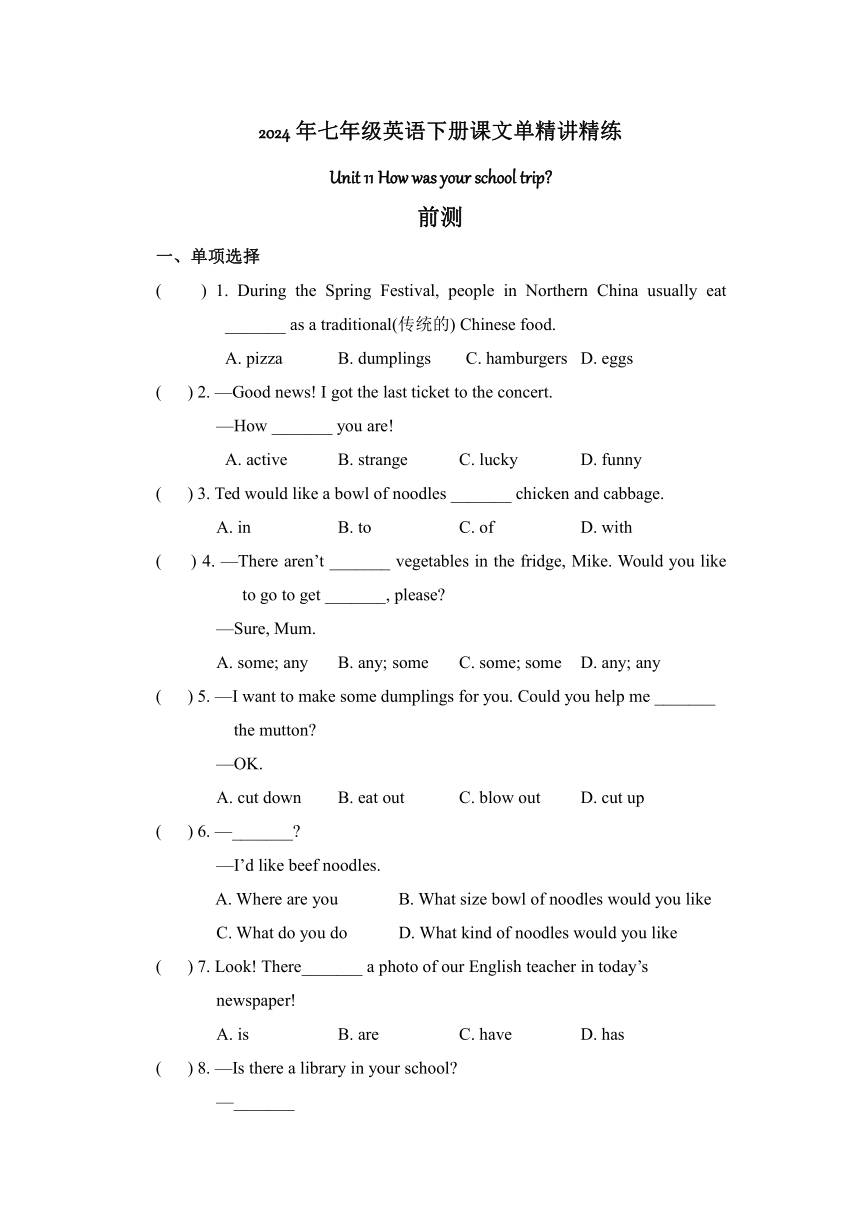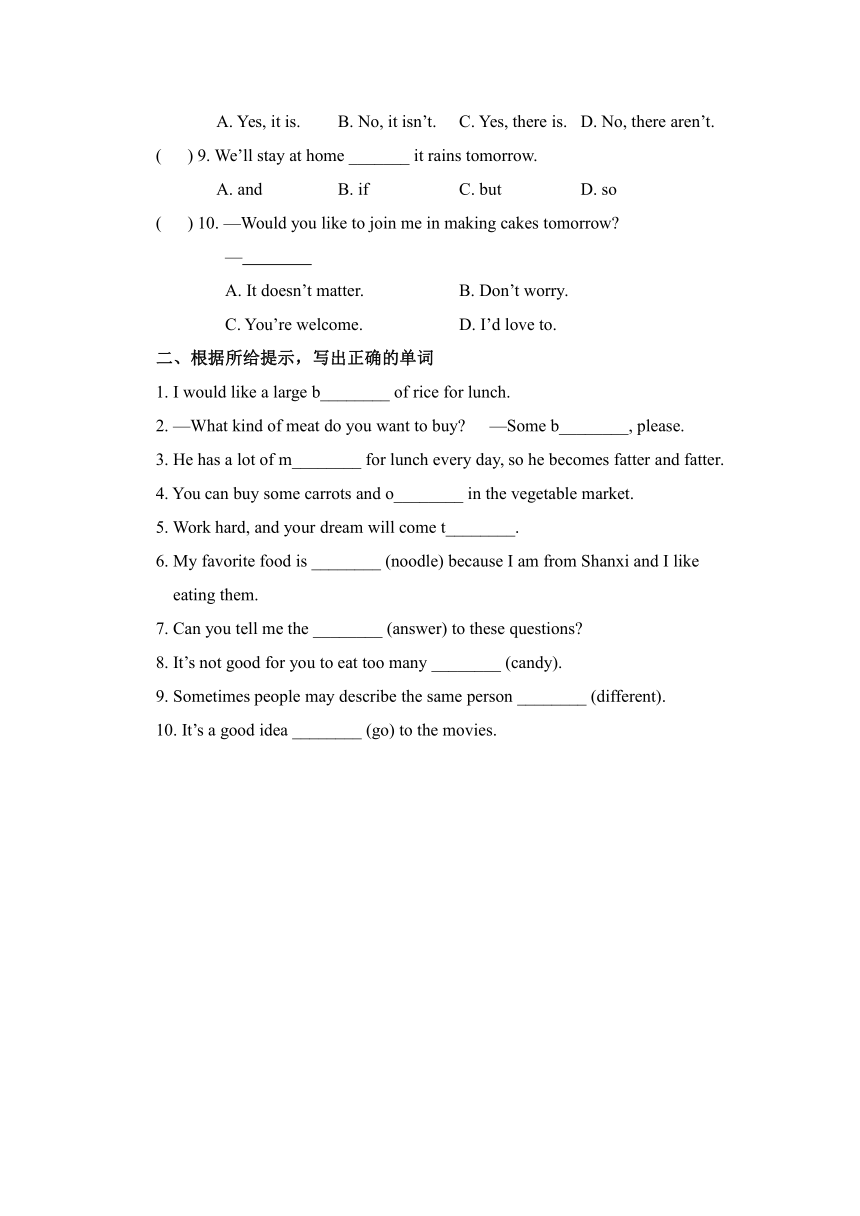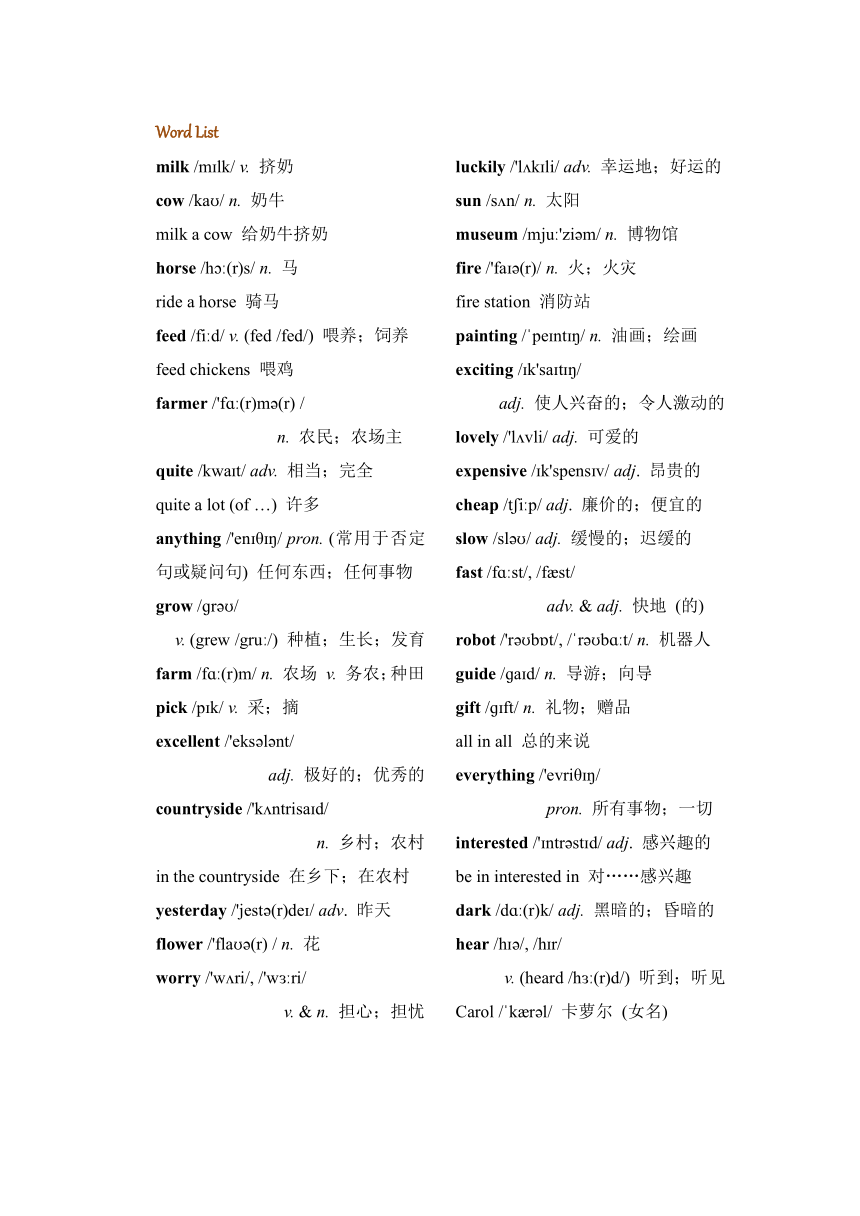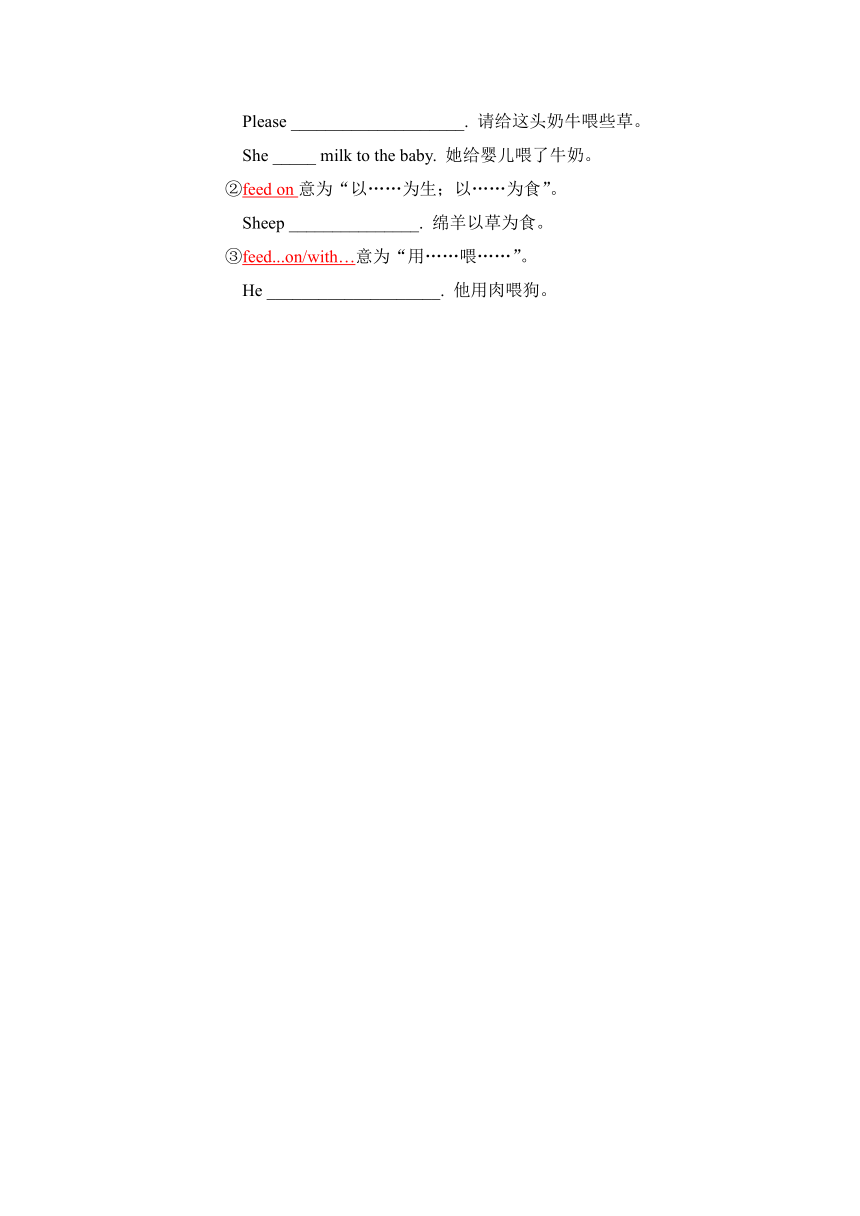Unit11 How was your school trip?课文单词精讲精练 人教版七年级英语下册(无答案)
文档属性
| 名称 | Unit11 How was your school trip?课文单词精讲精练 人教版七年级英语下册(无答案) |

|
|
| 格式 | docx | ||
| 文件大小 | 57.1KB | ||
| 资源类型 | 教案 | ||
| 版本资源 | 人教新目标(Go for it)版 | ||
| 科目 | 英语 | ||
| 更新时间 | 2024-03-05 00:00:00 | ||
图片预览





文档简介
2024年七年级英语下册课文单精讲精练
Unit 11 How was your school trip
前测
一、单项选择
( ) 1. During the Spring Festival, people in Northern China usually eat _______ as a traditional(传统的) Chinese food.
A. pizza B. dumplings C. hamburgers D. eggs
( ) 2. —Good news! I got the last ticket to the concert.
—How _______ you are!
A. active B. strange C. lucky D. funny
( ) 3. Ted would like a bowl of noodles _______ chicken and cabbage.
A. in B. to C. of D. with
( ) 4. —There aren’t _______ vegetables in the fridge, Mike. Would you like to go to get _______, please
—Sure, Mum.
A. some; any B. any; some C. some; some D. any; any
( ) 5. —I want to make some dumplings for you. Could you help me _______
the mutton
—OK.
A. cut down B. eat out C. blow out D. cut up
( ) 6. —_______
—I’d like beef noodles.
A. Where are you B. What size bowl of noodles would you like
C. What do you do D. What kind of noodles would you like
( ) 7. Look! There_______ a photo of our English teacher in today’s
newspaper!
A. is B. are C. have D. has
( ) 8. —Is there a library in your school
—_______
A. Yes, it is. B. No, it isn’t. C. Yes, there is. D. No, there aren’t.
( ) 9. We’ll stay at home _______ it rains tomorrow.
A. and B. if C. but D. so
( ) 10. —Would you like to join me in making cakes tomorrow
—
A. It doesn’t matter. B. Don’t worry.
C. You’re welcome. D. I’d love to.
二、根据所给提示,写出正确的单词
1. I would like a large b________ of rice for lunch.
2. —What kind of meat do you want to buy —Some b________, please.
3. He has a lot of m________ for lunch every day, so he becomes fatter and fatter.
4. You can buy some carrots and o________ in the vegetable market.
5. Work hard, and your dream will come t________.
6. My favorite food is ________ (noodle) because I am from Shanxi and I like
eating them.
7. Can you tell me the ________ (answer) to these questions
8. It’s not good for you to eat too many ________ (candy).
9. Sometimes people may describe the same person ________ (different).
10. It’s a good idea ________ (go) to the movies.
Word List
milk /m lk/ v. 挤奶
cow /ka / n. 奶牛
milk a cow 给奶牛挤奶
horse /h (r)s/ n. 马
ride a horse 骑马
feed /fi d/ v. (fed /fed/) 喂养;饲养
feed chickens 喂鸡
farmer /'fɑ (r)m (r) /
n. 农民;农场主
quite /kwa t/ adv. 相当;完全
quite a lot (of …) 许多
anything /'en θ / pron. (常用于否定句或疑问句) 任何东西;任何事物
grow /ɡr /
v. (grew /gru /) 种植;生长;发育
farm /fɑ (r)m/ n. 农场 v. 务农;种田
pick /p k/ v. 采;摘
excellent /'eks l nt/
adj. 极好的;优秀的
countryside /'k ntrisa d/
n. 乡村;农村
in the countryside 在乡下;在农村
yesterday /'jest (r)de / adv. 昨天
flower /'fla (r) / n. 花
worry /'w ri/, /'w ri/
v. & n. 担心;担忧
luckily /'l k li/ adv. 幸运地;好运的
sun /s n/ n. 太阳
museum /mju 'zi m/ n. 博物馆
fire /'fa (r)/ n. 火;火灾
fire station 消防站
painting / pe nt / n. 油画;绘画
exciting / k'sa t /
adj. 使人兴奋的;令人激动的
lovely /'l vli/ adj. 可爱的
expensive / k'spens v/ adj. 昂贵的
cheap /t i p/ adj. 廉价的;便宜的
slow /sl / adj. 缓慢的;迟缓的
fast /fɑ st/, /f st/
adv. & adj. 快地 (的)
robot /'r b t/, / r bɑ t/ n. 机器人
guide /ɡa d/ n. 导游;向导
gift /ɡ ft/ n. 礼物;赠品
all in all 总的来说
everything /'evriθ /
pron. 所有事物;一切
interested /' ntr st d/ adj. 感兴趣的
be in interested in 对……感兴趣
dark /dɑ (r)k/ adj. 黑暗的;昏暗的
hear /h /, /h r/
v. (heard /h (r)d/) 听到;听见
Carol / k r l/ 卡萝尔 (女名)
Section A —— 2d
Peter: Hi, Eric. How was your trip last week
Eric: It was excellent. I visited my grandparents in the countryside.
Peter: Oh, nice. What did you do
Eric: I went fishing every day. And I fed the chickens with my grandpa. It was so much fun.
Peter: Sounds good. How was the weather there
Eric: It was great, and the air was so clean. I watched the stars at night. They were so beautiful.
Peter: Lucky you.
重点词汇详解
1. excellent adj. “极好的;优秀的”=very good
【填空】①The food __________ here. 这里的食物很好。
②She is _______________. 她是位优秀的医生。
【拓展】_______________ 意为“在……方面极好”
He _______________ math. 他的数学非常好。
2. countryside n. “乡村;农村”不可数名词
【短语】_______________ 在乡下;在农村
【填空】I’m from _______________. 我来自农村。
【拓展】country用作名词,通常是“国家”的意思,但在某些语境下也有“农村;乡下”的意思。
China is _______________. 中国是一个大国。
My uncle lives _______________. 我叔叔住在乡下。
3. feed v. “喂养;饲养”feeds feeding fed
【填空】①I _______________ every day. 我每天都喂鸡。
②My father’s job is _______________ animals.
我父亲的工作是喂养动物。
【拓展】feed的常见用法有:
①feed sth. to sb./sth. 意为“把某物喂给某人/某物”。
Please ____________________. 请给这头奶牛喂些草。
She _____ milk to the baby. 她给婴儿喂了牛奶。
②feed on意为“以……为生;以……为食”。
Sheep _______________. 绵羊以草为食。
③feed...on/with…意为“用……喂……”。
He ____________________. 他用肉喂狗。
Section B —— 2b
June 15th Today I went on a school trip. We visited the science museum and it was really interesting. We got there so fast by train. We saw some farms and villages along the way. At the museum, I learned a lot about robots. I didn’t know they could play chess with us. It was so cool! Then the guide taught us how to make a model robot. I took a lot of great photos, too. After that, I went to the gift shop and bought some lovely gifts for my parents. They weren’t expensive. All in all, it was an exciting day. June 15th I think today’s school trip was terrible. We took the train to the museum. It was so hot on the slow train. The museum was big and boring. Everything was about robots and I’m not interested in that. The rooms were really dark and it was difficult to take photos, so I didn’t take any. There were also too many people and I couldn’t really see or hear the guide. The things in the gift shop were so expensive. I didn’t like the trip at all.
重点词汇详解
1. go on a trip“去旅行”= have a trip
【填空】①Do you want to _______________ 你想和我一起去旅行吗
②He ____________________ last year. 去年,他去上海旅行了。
【拓展】go on常与表示旅行、远足、野餐、航海等的名词连用,意为“去……” __________ 去远足 __________ 去野餐
__________ 去访问 __________ 去度假
2. fast adv. “快地”,反义词为slowly adj.“快的”,反义词为slow
【填空】①The boy __________. 这个男孩跑得快。
②We can take __________. 我们可以乘快车。
3. learn about“学习/知道/了解关于……”。
【填空】①I’d like to _______________ Mr. Green.
我想了解关于格林先生的事情。
②I’d like to _________________________.
我想学习更多关于电脑的知识。
4. guide n. “导游;向导”guides
【填空】①_______________ showed us around the museum.
导游带我们参观了博物馆。
②I’m reading ____________________. 我在看《英语语法指南》。
【拓展】v. guide“带领;引导”guides guiding guided
_______________ across the road. 她领着她的学生过马路。
5. a lot (of…)= quite a lot (of…) “许多”
【填空】①She is very young, but she knows __________.
她很年轻,但懂得很多。
②I have ____________________ to do every day.
我每天有许多家庭作业要做。
③I have _______________ to tell you. 我有很多事情要告诉你。
6. lovely adj. “可爱的”
【填空】①What _______________! 多么可爱的女孩!
②We can see __________ here. 在这里我们能看到美丽的景色。
【拓展】英语中有一些和lovely一样以-ly结尾的词是形容词,而不是副词。
_____ 友好的 _____ 生气勃勃的;(色彩)鲜艳的
_____ 孤独的;寂寞的 _____ 很可能的;合适的;有希望的
7. all in all“总的说来”,常用于句首
【填空】__________, it is a great success. 总的说来,它非常成功。
【辨析】all in all, in all & at all
all in all “总的说来” 常用于句首 ______, we had a good time. 总的说来,我们过得愉快。
in all “总共; 合计” 既可放在句首 也可放在句末 There are thirty students ____. 共有30名学生。
at all “根本” 常用于否定句,not...at all 意为“根本不” He _____ like apples _____. 他根本不喜欢苹果。
【拓展】not at all常用来回答感谢,意为“不用谢;不客气”。
—Thank you very much. 多谢你了。
—__________. 不客气。
8. exciting adj. “使人兴奋的;令人激动的”
【填空】I’ve got some _______________ for you.
我给你带来一些很激动人心的消息。
The story is _______________. 这个故事让人很兴奋。
【辨析】 exciting & excited
exciting 使人兴奋的; 令人激动的 在句中可作定语或表语,作表语时,主语通常为物
excited 兴奋的;激动的 在句中常作表语,此时主语通常为人
【填空】Everyone __________ when they heard _______________.
当听到这个令人兴奋的消息时,大家都激动不已。
9. everything pron. “所有事物;一切”
【拓展】anything pron.“任何东西;任何事物”,常用于否定句和疑问句中
【填空】①Do you want _______________ 你想从我这里要什么东西吗?
②You can _______________ you want to know.
你可以问我你想知道的任何事。
③We _______________ he says.
无论他说什么,我们都不能相信。
【拓展】①在表示请求、建议或征求意见的疑问句中常用something,
不用anything.
Would you like _______________ 你想要点儿喝的东西吗
②anything用作主语时,谓语用单数形式。
__________ is better than __________, isn’t it
有点儿总比什么都没有好,不是吗
③形容词修饰复合不定代词something, anything等时,形容词要后置。
Did you hear _______________ there
你在那儿听到什么有趣的事了吗
10. be interested in sth.“对某事(物)感兴趣”
be interested in doing sth.“对做某事感兴趣”
【填空】①I’m interested in __________. 我对这部电影感兴趣。
②He is interested in __________. 他对踢足球感兴趣。
11. dark adj. “黑暗的;昏暗的”,反义词为bright
【填空】It’s __________. 天快黑了。
【拓展】①dark用作形容词,还可意为“(颜色)深的”;
反义词为light,意为“(颜色)浅的”。
I like __________. 我喜欢深蓝色。
②dark用作名词,意为“黑暗;暗处”。
She could see nothing __________. 她在黑暗中什么也看不见。
12. hear v. “听到;听见”hears hearing heard
【短语】__________ 听说 __________ 接到……的来信(电话等)
【填空】①I _______________ in the middle of the night.
半夜里我听到一种奇怪的声音。
②I _______________ it yesterday. 我是昨天听说那件事的。
③I often __________ my sister. 我经常收到我姐姐的来信。
【拓展】①hear sb. do sth.表示“听见某人做了某事或经常做某事”;
I often _____ the young man _____ in the next room.
我经常听到那个年轻人在隔壁房间唱歌。
②hear sb. doing sth.表示“听见某人正在做某事”。
I _____ them _____ when I passed his house.
我经过他的房子时听到他们在笑。
后测
一、单项选择
( ) 1. We learned a lot _______ animals in the zoo.
A. in B. with C. about D. for
( ) 2. I want to know _______ to make a model plane.
A. who B. where C. what D. how
( ) 3. I _______ a student last year but now I _______ a teacher.
A. am; am B. was; am C. am; was D. was; was
( ) 4. His uncle is good at farming. He works on a _______.
A. hospital B. bank C. farm D. hotel
( ) 5. —Were you at home _______
—No, I weren’t.
A. yesterday B. every day C. next Monday D. now
( ) 6. They can’t see _______ in the dark.
A. something B. anything C. everything D. nothing
( ) 7. Amy helped her grandma _______ the cat this morning.
A. blow B. feed C. pick D. milk
( ) 8. All of you, be quiet! I can’t _______ the teacher.
A. watch B. see C. hear D. listen
( ) 9. —How was Tim’s trip
—_______.
A. It is OK B. He was fine C. It was great D. He had a trip
( ) 10. —Did he visit the museum last Sunday
—_______. He played the piano.
A. Yes, he did B. No, he didn’t C. Yes, he does D. No, he doesn’t
二、根据所给提示,写出正确的单词
1. He went to the farm and ________ (feed) many chickens there.
2. My friend gave me a ________ (love) dog yesterday.
3. Is there ________ (something) new in today’s newspaper
4. The old man walked ________ (slow).
5. It was ________ (sun) yesterday.
6. I like this movie. I think it’s very e_______.
7. L________, he passed the exam.
8. He m________ a cow yesterday.
9. Look! The f________ are busy working on the farm.
10. Don’t w________. He will be back soon.
Unit 11 How was your school trip
前测
一、单项选择
( ) 1. During the Spring Festival, people in Northern China usually eat _______ as a traditional(传统的) Chinese food.
A. pizza B. dumplings C. hamburgers D. eggs
( ) 2. —Good news! I got the last ticket to the concert.
—How _______ you are!
A. active B. strange C. lucky D. funny
( ) 3. Ted would like a bowl of noodles _______ chicken and cabbage.
A. in B. to C. of D. with
( ) 4. —There aren’t _______ vegetables in the fridge, Mike. Would you like to go to get _______, please
—Sure, Mum.
A. some; any B. any; some C. some; some D. any; any
( ) 5. —I want to make some dumplings for you. Could you help me _______
the mutton
—OK.
A. cut down B. eat out C. blow out D. cut up
( ) 6. —_______
—I’d like beef noodles.
A. Where are you B. What size bowl of noodles would you like
C. What do you do D. What kind of noodles would you like
( ) 7. Look! There_______ a photo of our English teacher in today’s
newspaper!
A. is B. are C. have D. has
( ) 8. —Is there a library in your school
—_______
A. Yes, it is. B. No, it isn’t. C. Yes, there is. D. No, there aren’t.
( ) 9. We’ll stay at home _______ it rains tomorrow.
A. and B. if C. but D. so
( ) 10. —Would you like to join me in making cakes tomorrow
—
A. It doesn’t matter. B. Don’t worry.
C. You’re welcome. D. I’d love to.
二、根据所给提示,写出正确的单词
1. I would like a large b________ of rice for lunch.
2. —What kind of meat do you want to buy —Some b________, please.
3. He has a lot of m________ for lunch every day, so he becomes fatter and fatter.
4. You can buy some carrots and o________ in the vegetable market.
5. Work hard, and your dream will come t________.
6. My favorite food is ________ (noodle) because I am from Shanxi and I like
eating them.
7. Can you tell me the ________ (answer) to these questions
8. It’s not good for you to eat too many ________ (candy).
9. Sometimes people may describe the same person ________ (different).
10. It’s a good idea ________ (go) to the movies.
Word List
milk /m lk/ v. 挤奶
cow /ka / n. 奶牛
milk a cow 给奶牛挤奶
horse /h (r)s/ n. 马
ride a horse 骑马
feed /fi d/ v. (fed /fed/) 喂养;饲养
feed chickens 喂鸡
farmer /'fɑ (r)m (r) /
n. 农民;农场主
quite /kwa t/ adv. 相当;完全
quite a lot (of …) 许多
anything /'en θ / pron. (常用于否定句或疑问句) 任何东西;任何事物
grow /ɡr /
v. (grew /gru /) 种植;生长;发育
farm /fɑ (r)m/ n. 农场 v. 务农;种田
pick /p k/ v. 采;摘
excellent /'eks l nt/
adj. 极好的;优秀的
countryside /'k ntrisa d/
n. 乡村;农村
in the countryside 在乡下;在农村
yesterday /'jest (r)de / adv. 昨天
flower /'fla (r) / n. 花
worry /'w ri/, /'w ri/
v. & n. 担心;担忧
luckily /'l k li/ adv. 幸运地;好运的
sun /s n/ n. 太阳
museum /mju 'zi m/ n. 博物馆
fire /'fa (r)/ n. 火;火灾
fire station 消防站
painting / pe nt / n. 油画;绘画
exciting / k'sa t /
adj. 使人兴奋的;令人激动的
lovely /'l vli/ adj. 可爱的
expensive / k'spens v/ adj. 昂贵的
cheap /t i p/ adj. 廉价的;便宜的
slow /sl / adj. 缓慢的;迟缓的
fast /fɑ st/, /f st/
adv. & adj. 快地 (的)
robot /'r b t/, / r bɑ t/ n. 机器人
guide /ɡa d/ n. 导游;向导
gift /ɡ ft/ n. 礼物;赠品
all in all 总的来说
everything /'evriθ /
pron. 所有事物;一切
interested /' ntr st d/ adj. 感兴趣的
be in interested in 对……感兴趣
dark /dɑ (r)k/ adj. 黑暗的;昏暗的
hear /h /, /h r/
v. (heard /h (r)d/) 听到;听见
Carol / k r l/ 卡萝尔 (女名)
Section A —— 2d
Peter: Hi, Eric. How was your trip last week
Eric: It was excellent. I visited my grandparents in the countryside.
Peter: Oh, nice. What did you do
Eric: I went fishing every day. And I fed the chickens with my grandpa. It was so much fun.
Peter: Sounds good. How was the weather there
Eric: It was great, and the air was so clean. I watched the stars at night. They were so beautiful.
Peter: Lucky you.
重点词汇详解
1. excellent adj. “极好的;优秀的”=very good
【填空】①The food __________ here. 这里的食物很好。
②She is _______________. 她是位优秀的医生。
【拓展】_______________ 意为“在……方面极好”
He _______________ math. 他的数学非常好。
2. countryside n. “乡村;农村”不可数名词
【短语】_______________ 在乡下;在农村
【填空】I’m from _______________. 我来自农村。
【拓展】country用作名词,通常是“国家”的意思,但在某些语境下也有“农村;乡下”的意思。
China is _______________. 中国是一个大国。
My uncle lives _______________. 我叔叔住在乡下。
3. feed v. “喂养;饲养”feeds feeding fed
【填空】①I _______________ every day. 我每天都喂鸡。
②My father’s job is _______________ animals.
我父亲的工作是喂养动物。
【拓展】feed的常见用法有:
①feed sth. to sb./sth. 意为“把某物喂给某人/某物”。
Please ____________________. 请给这头奶牛喂些草。
She _____ milk to the baby. 她给婴儿喂了牛奶。
②feed on意为“以……为生;以……为食”。
Sheep _______________. 绵羊以草为食。
③feed...on/with…意为“用……喂……”。
He ____________________. 他用肉喂狗。
Section B —— 2b
June 15th Today I went on a school trip. We visited the science museum and it was really interesting. We got there so fast by train. We saw some farms and villages along the way. At the museum, I learned a lot about robots. I didn’t know they could play chess with us. It was so cool! Then the guide taught us how to make a model robot. I took a lot of great photos, too. After that, I went to the gift shop and bought some lovely gifts for my parents. They weren’t expensive. All in all, it was an exciting day. June 15th I think today’s school trip was terrible. We took the train to the museum. It was so hot on the slow train. The museum was big and boring. Everything was about robots and I’m not interested in that. The rooms were really dark and it was difficult to take photos, so I didn’t take any. There were also too many people and I couldn’t really see or hear the guide. The things in the gift shop were so expensive. I didn’t like the trip at all.
重点词汇详解
1. go on a trip“去旅行”= have a trip
【填空】①Do you want to _______________ 你想和我一起去旅行吗
②He ____________________ last year. 去年,他去上海旅行了。
【拓展】go on常与表示旅行、远足、野餐、航海等的名词连用,意为“去……” __________ 去远足 __________ 去野餐
__________ 去访问 __________ 去度假
2. fast adv. “快地”,反义词为slowly adj.“快的”,反义词为slow
【填空】①The boy __________. 这个男孩跑得快。
②We can take __________. 我们可以乘快车。
3. learn about“学习/知道/了解关于……”。
【填空】①I’d like to _______________ Mr. Green.
我想了解关于格林先生的事情。
②I’d like to _________________________.
我想学习更多关于电脑的知识。
4. guide n. “导游;向导”guides
【填空】①_______________ showed us around the museum.
导游带我们参观了博物馆。
②I’m reading ____________________. 我在看《英语语法指南》。
【拓展】v. guide“带领;引导”guides guiding guided
_______________ across the road. 她领着她的学生过马路。
5. a lot (of…)= quite a lot (of…) “许多”
【填空】①She is very young, but she knows __________.
她很年轻,但懂得很多。
②I have ____________________ to do every day.
我每天有许多家庭作业要做。
③I have _______________ to tell you. 我有很多事情要告诉你。
6. lovely adj. “可爱的”
【填空】①What _______________! 多么可爱的女孩!
②We can see __________ here. 在这里我们能看到美丽的景色。
【拓展】英语中有一些和lovely一样以-ly结尾的词是形容词,而不是副词。
_____ 友好的 _____ 生气勃勃的;(色彩)鲜艳的
_____ 孤独的;寂寞的 _____ 很可能的;合适的;有希望的
7. all in all“总的说来”,常用于句首
【填空】__________, it is a great success. 总的说来,它非常成功。
【辨析】all in all, in all & at all
all in all “总的说来” 常用于句首 ______, we had a good time. 总的说来,我们过得愉快。
in all “总共; 合计” 既可放在句首 也可放在句末 There are thirty students ____. 共有30名学生。
at all “根本” 常用于否定句,not...at all 意为“根本不” He _____ like apples _____. 他根本不喜欢苹果。
【拓展】not at all常用来回答感谢,意为“不用谢;不客气”。
—Thank you very much. 多谢你了。
—__________. 不客气。
8. exciting adj. “使人兴奋的;令人激动的”
【填空】I’ve got some _______________ for you.
我给你带来一些很激动人心的消息。
The story is _______________. 这个故事让人很兴奋。
【辨析】 exciting & excited
exciting 使人兴奋的; 令人激动的 在句中可作定语或表语,作表语时,主语通常为物
excited 兴奋的;激动的 在句中常作表语,此时主语通常为人
【填空】Everyone __________ when they heard _______________.
当听到这个令人兴奋的消息时,大家都激动不已。
9. everything pron. “所有事物;一切”
【拓展】anything pron.“任何东西;任何事物”,常用于否定句和疑问句中
【填空】①Do you want _______________ 你想从我这里要什么东西吗?
②You can _______________ you want to know.
你可以问我你想知道的任何事。
③We _______________ he says.
无论他说什么,我们都不能相信。
【拓展】①在表示请求、建议或征求意见的疑问句中常用something,
不用anything.
Would you like _______________ 你想要点儿喝的东西吗
②anything用作主语时,谓语用单数形式。
__________ is better than __________, isn’t it
有点儿总比什么都没有好,不是吗
③形容词修饰复合不定代词something, anything等时,形容词要后置。
Did you hear _______________ there
你在那儿听到什么有趣的事了吗
10. be interested in sth.“对某事(物)感兴趣”
be interested in doing sth.“对做某事感兴趣”
【填空】①I’m interested in __________. 我对这部电影感兴趣。
②He is interested in __________. 他对踢足球感兴趣。
11. dark adj. “黑暗的;昏暗的”,反义词为bright
【填空】It’s __________. 天快黑了。
【拓展】①dark用作形容词,还可意为“(颜色)深的”;
反义词为light,意为“(颜色)浅的”。
I like __________. 我喜欢深蓝色。
②dark用作名词,意为“黑暗;暗处”。
She could see nothing __________. 她在黑暗中什么也看不见。
12. hear v. “听到;听见”hears hearing heard
【短语】__________ 听说 __________ 接到……的来信(电话等)
【填空】①I _______________ in the middle of the night.
半夜里我听到一种奇怪的声音。
②I _______________ it yesterday. 我是昨天听说那件事的。
③I often __________ my sister. 我经常收到我姐姐的来信。
【拓展】①hear sb. do sth.表示“听见某人做了某事或经常做某事”;
I often _____ the young man _____ in the next room.
我经常听到那个年轻人在隔壁房间唱歌。
②hear sb. doing sth.表示“听见某人正在做某事”。
I _____ them _____ when I passed his house.
我经过他的房子时听到他们在笑。
后测
一、单项选择
( ) 1. We learned a lot _______ animals in the zoo.
A. in B. with C. about D. for
( ) 2. I want to know _______ to make a model plane.
A. who B. where C. what D. how
( ) 3. I _______ a student last year but now I _______ a teacher.
A. am; am B. was; am C. am; was D. was; was
( ) 4. His uncle is good at farming. He works on a _______.
A. hospital B. bank C. farm D. hotel
( ) 5. —Were you at home _______
—No, I weren’t.
A. yesterday B. every day C. next Monday D. now
( ) 6. They can’t see _______ in the dark.
A. something B. anything C. everything D. nothing
( ) 7. Amy helped her grandma _______ the cat this morning.
A. blow B. feed C. pick D. milk
( ) 8. All of you, be quiet! I can’t _______ the teacher.
A. watch B. see C. hear D. listen
( ) 9. —How was Tim’s trip
—_______.
A. It is OK B. He was fine C. It was great D. He had a trip
( ) 10. —Did he visit the museum last Sunday
—_______. He played the piano.
A. Yes, he did B. No, he didn’t C. Yes, he does D. No, he doesn’t
二、根据所给提示,写出正确的单词
1. He went to the farm and ________ (feed) many chickens there.
2. My friend gave me a ________ (love) dog yesterday.
3. Is there ________ (something) new in today’s newspaper
4. The old man walked ________ (slow).
5. It was ________ (sun) yesterday.
6. I like this movie. I think it’s very e_______.
7. L________, he passed the exam.
8. He m________ a cow yesterday.
9. Look! The f________ are busy working on the farm.
10. Don’t w________. He will be back soon.
同课章节目录
- Unit 1 Can you play the guitar?
- Section A
- Section B
- Unit 2 What time do you go to school?
- Section A
- Section B
- Unit 3 How do you get to school?
- Section A
- Section B
- Unit 4 Don't eat in class.
- Section A
- Section B
- Unit 5 Why do you like pandas?
- Section A
- Section B
- Unit 6 I'm watching TV.
- Section A
- Section B
- Review of Units 1-6
- Unit 7 It's raining!
- Section A
- Section B
- Unit 8 Is there a post office near here?
- Section A
- Section B
- Unit 9 What does he look like?
- Section A
- Section B
- Unit 10 I'd like some noodles.
- Section A
- Section B
- Unit 11 How was your school trip?
- Section A
- Section B
- Unit 12 What did you do last weekend?
- Section A
- Section B
